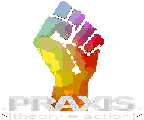





 |
 |
 |
 |
 |
 |

SOCGRAD MINI-LECTURES
Nothing is quite so strange to the ear of those whose knowledge processes key off of either modern or pre-modern assumptions and processes. For many postmodernity is a pejorative label referring to that writing which denies the possibility of objective knowledge, formal axiomatic theory, replication, falsifiability, prediction, order and stability of truth values in the knowledge process. Those who work out of postmodern modalities find themselves the target of much invective and the agent of much distress in art, science, religion and gender relations. So what is postmodernity all about??? That is the topic for today's mini-lecture brought to you by the Red Feather Institute for Advanced Studies in Sociology.
This lecture was published in the Michigan Sociological Review, Fall, 1994:4....but you can copy and use this outline.
A. Premodern, Modern and postmodern approaches to the knowledge process are complementary rather than antagonistic/exclusive. Each contributes much to the knowledge process and, together, they can help fashion a good and decent society; one in which the processes by which social reality are constituted are open to public discourse and democratic human agency.
B. Epochs1 of Social Knowledge--Missions:
1. Pre-modern: Revelation of Divine Plan through Ecstacy; escape from both the
objective and the subjective.
2. Modern [c. 1650]: Discovery of universal Law through objective observation; denial of
the subjective role in constituting concepts, theory or methods.
3. Post-modern: Location of the knowledge process in its social and economic context;
reaffirmation of the subjective in setting standards; critique of both pure and practical
Reason.
C. Origins of each Epoch:
1. Premodern: In the effort to deal with the forces of nature; the facts of personal and collective experience; with that which is not directly observable: dreams, cycles of the season, long term change and recurrent problems. In the effort of peoples to live in harmony with each other and with the ecology upon which all life depends.
2. The Modern: In the successes of Copernicus, Galileo and Newton to describe and explain
events and processes not directly observable. In the great successes of modern physics,
chemistry, astronomy, and biology to unravel the secrets of nature. In the effort to place
the human upon equal standing with the gods as a knowing and acting agent. The
Enlightenment, humanism and science all dwell in the same epistemological palace.
3. The Postmodern: In the struggles of women, workers, colonial subjects and minority
groups to create better social relations. In the refusal of people to take either God or
Science as the final Authority on social truth. In the art, music, theatre, poetry,
operatics and literature of social critics [and now in the ontology of Chaos theory].
D. The Ontology of Social Reality in Each Epoch:
1. Dualistic: Pure forms in God's Mind; imperfect approximations in human behavior in the material world; ideal superior to real.
2. Monistic: One and only one objective reality. Phenomena v. noumena; noumena real, phenomena that which is perceived.
3. Pluralistic: Any number of forms; possibilities of each vary over time in a given environment. All are in some important sense, phenomena.
E. Pathways to knowledge in Each Epoch2:
1. Entrance into the Dream-world; discarding worldly distractions. Purification
and receptivity.
2. Empirical study of this world in every detail.
3. Collective participation in creating social life: one knows social reality best if one
helps produce it. Some deny the possibility of reliable knowledge.
F. Purpose of Social Knowledge Process:
1. Pre-modern: escape alienation
2. Modern: minimize alienation
3. Post-modern: varies--for some it is to enhance personal welfare; for others, collective
praxis
ACCESSIBLE REFERENCES
Footnotes
1 It is important to note that these are not stages in intellectual maturity but rather complementary and decidedly human ways of approaching the knowledge process. However, pre-modern thinking would tend to view both scientific and post-modern ways as regression from a golden age while modern thinking lends itself to evolutionary stage theory guided by rationality if not by reason. Return
2 The pathways to knowledge in each epoch are manifold: in pre-modern thought dancing, gambling, mind altering drugs, chanting, pain, starvation and other psychogens helped one come into contact with the Holy. In modern science, empirical research tended to trump other ways of knowing. Post-modern thought accepts a plurality of knowledge forms and a plurality of pathways to each knowledge form. In critical theory, for example, there are three major forms of knowledge useful to a good and decent society: positive knowledge about what is; hermeneutical knowledge about intersubjective understanding and emancipatory knowledge interested in change and renewal oriented to praxis; each form has many sources. Return